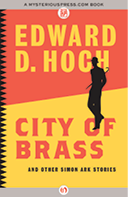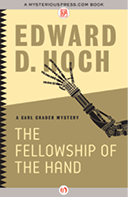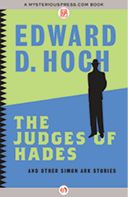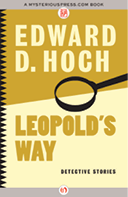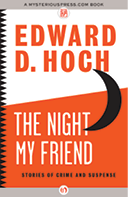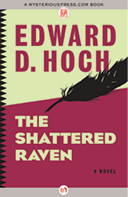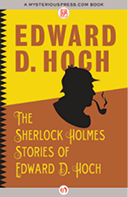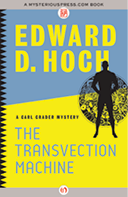The Frankenstein Factory (22 page)
Read The Frankenstein Factory Online
Authors: Edward D. Hoch

“Why?” She was busy tying Armstrong’s hands with heavy cord.
“Whalen supposedly escaped by slugging Armstrong when the doctor took him some food, but the fact that Whalen circled the island and came back after dark indicates that he was meeting someone. He certainly didn’t come back to meet Frank, who was still unconscious. More likely, he was meeting the man who helped him escape. Armstrong couldn’t kill him in his room without attracting suspicion, so he let him escape on condition that Whalen come back for him after dark. Armstrong probably promised the stolen files and film as bait. Whalen came back and was killed. And Armstrong planted sand and bits of skin and blood to implicate Frank—just as he undid the straps to implicate him.”
“And Tony?”
“Armstrong was out helping me cut wood for the bonfire. It was the easiest thing in the world to come upon Tony and stab him there among the trees. I probably wasn’t more than twenty feet away, but I never heard a thing. As luck would have it, Tony revived long enough to stagger onto the beach and collapse on our pile of wood. The impression given us was that he was stabbed
after
we all entered the house and found Frank missing. Then we all alibied each other, seeming to leave Frank as the only possible killer.”
“But how could Armstrong have killed Hobbes? You were together at the time.”
Earl produced the loop of wire from his pocket. “I’ll admit that had me stumped. And there was a very real possibility that you could have crept around from behind the house.”
“Except that I have been scared to death of running into Frank in the dark!”
“But what Armstrong did was simple. He went down the steps to scout around for Frank while Hobbes and I waited inside. That was when he looped this nearly invisible wire around the railing supports on either side of the steps. Hobbes came down then, tripped on the wire, and fell forward as if wounded. Armstrong dashed down the steps, as if to render aid, and pulled the murder knife from his shirt front, as he did just now. With his body blocking my view, he sliced quickly through the wire, to get it out of the way, and then plunged the knife into Hobbes’s chest. When I reached him and saw it, I thought the weapon had been thrown.”
“Why didn’t Hobbes tell you what happened?”
“That must have given Armstrong a bad moment, when he realized the old man was still alive. But it had all happened so fast that Hobbes never realized Armstrong had stabbed him. He used his last gasp of breath to try and tell me about Emily Watson instead.”
“Armstrong was lucky.”
“He was that!” Earl agreed. “Later, of course, he un-looped the wire, curled it up, and tossed it away. Only I found it and thought about what it was doing there. It took me a while, but I finally caught on.”
“You mean just the wire told you that Armstrong was the killer?”
“That got me thinking. There were the points I’ve already mentioned, and then there was one other—the behavior of Frank. This was a man—murderer or not—who awakened after some three decades to find his brain in another, much younger body. The operation was not totally successful—he couldn’t speak or use his left arm. But he was alive. Now I’ve already shown that for all his strength he couldn’t have been the killer, because some of the killer’s early crimes and activities involved the use of two hands. But if Frank
wasn’t
the killer, why did he try to kill us?”
“That’s the question I was just about to ask!”
“And the answer is—he didn’t.”
“
What?
Are we imagining those bandages on your hands?”
“Frank wasn’t trying to kill
us
—he was trying to kill Armstrong! Don’t you see? The attack in the house, the attack on the beach—both times he ignored us and went for Armstrong. In fact, the only time he really tried to kill me was down in the vault, when I had him trapped and he was fighting for his life.”
“You may be right,” she admitted.
“So I asked myself
why?
Why was the innocent Frank trying to kill Dr. Armstrong, the man who’d been nursing him back from the dead? There’s only one logical explanation. Frank saw Armstrong kill Hobbes on the steps outside. It’s quite likely, really. Certainly Frank would have been watching the house, and certainly he would have seen the light go on and the door open. Although Armstrong’s knife thrust was hidden from my view, it would have been perfectly clear to anyone to the front of him. Frank saw it, and knew that Armstrong was the killer. He couldn’t speak, but he knew he had to kill Armstrong before the rest of us died too. Perhaps while he was in his semiconscious state, earlier, he might even have been aware of Armstrong killing MacKenzie or Freddy in the operating room.”
“So he was trying to help us all the time!”
“We’ll never know for sure, but I think so.”
Armstrong had regained consciousness now, and he sat watching them from the floor. “What are you going to do with me?” he asked.
“Turn you over to the police when the rocketcopter returns.”
“I’m not mad, you know. I don’t want you to think that I’m mad.”
“Then why did you kill them all?” Vera asked.
“Why? I’ll tell you why.” He shifted his body slightly.
“I suppose it started because my name is Armstrong,” he began. “I think I told you that first day, Jazine, about what that name had meant to me. The all-American boy, the first man on the moon. There was always the name for me to live up to! You mentioned once a mystery by Agatha Christie about ten people on an island. I was well familiar with that book too, because one of the victims in it was named Dr. Armstrong! I was determined to be a winner, and not a victim. When the first thing happened—the bloody sheet and the disappearance of Emily Watson—I was reminded of the book. I didn’t know then what had happened to her, of course, but her apparent murder gave me the idea. If some others could be killed and their bodies hidden, it would seem part of the same crime. MacKenzie was first to go, and then O’Connor.”
“Why them?” Earl asked.
“Because they wanted the credit for it! With the chief surgeon and the brain-transplant man alive, no one Would give a second thought to poor old Armstrong! I wasn’t too successful in hiding MacKenzie’s body, so after that I stopped trying. I left Freddy O’Connor where he dropped.”
“But why was it necessary to kill the others?”
“I thought Hilda saw me washing blood from my hands after I killed Freddy. Maybe I was wrong, but I couldn’t risk leaving her alive. And I couldn’t trust Whalen. I didn’t want the Russians involved in this, and I didn’t know what secrets he had to give them. Tony Cooper was another one who wanted credit. And what credit there was rightly belonged to me, not to him!”
“And Hobbes?” Earl asked quietly.
“He was a liar from the start! I didn’t need your detective work to tell me that! I didn’t believe for a minute that Frank was his long-dead son Larry! And shortly after he spun that fairy tale he slipped and called him Frank, something he hadn’t often done before. Certainly he’d call his son Larry, not the demeaning ‘Frank.’ He wanted the credit and fame too—and that’s when I started trying to frame Frank for the killings. It would upset Hobbes, but I knew he’d never let you destroy him. Later, of course, when Frank tried to kill me, I wanted him dead, like everyone else.”
“Did you put up the signal flag Wednesday morning too?”
He nodded. “I knew how it worked from being here three months. And I had to have time with Frank. I couldn’t have the police coming here until I’d finished my work!”
“What about Frank? You wanted him kept alive at first.”
“Of course I did! He was my ticket to fame! With the rest of them out of the way, I would be his creator! I—Harry Armstrong!” He shook his head sadly. “And for this Frank tried to kill me. For this! I was going to make us both famous! Remember that old film about King Kong, the giant ape? The man who found him brought him to New York and exhibited him on a theater stage!”
“You and Frank,” Earl said sadly. “You and Frank touring the country.”
Vera went to the window. “I think the rocketcopter’s coming back in.”
Armstrong raised his head. “Give me a chance, will you? What say—a game of laser for my freedom?”
“You would have killed us all, wouldn’t you?” Earl answered with a question of his own.
“No, no! Only the ones I had to! I wouldn’t have harmed you or Vera!”
“I’ll bet!”
“You’re turning me over to the authorities?”
“Yes.”
He seemed to accept it then. “At least I’ll get credit for it, won’t I? For Frank and everything? I’ll be the first doctor who ever treated a reanimated man! That’s something to be remembered for!”
Earl went outside to meet the police captain and tell him how it all happened. The man listened gravely, nodding from time to time while an assistant recorded it all on a wristwire. Then they went inside to pick up their prisoner.
Vera and Earl spent the rest of the day and that night at a resort hotel in Guaymas. In the morning he went downtown for another meeting with Mexican officials.
“Armstrong will be disappointed,” he told her. “They’ve decided to treat it as an ordinary murder case and to cover up all this business about the operation and reanimation. With Frank dead they see no reason to bring it to light. They fear it would only cause a sensation and bring the world’s press storming onto Baja. The captain looked quite distasteful when he spoke of ‘this Frankenstein matter,’ and I suppose he has a point.”
“What will happen to the other bodies in those capsules?”
“I suspect there aren’t too many of them. Lawrence Hobbes was not an honest man. But the bodies that are frozen will be transferred to one of the existing cryonics societies in California.”
“You’re going back to New York?”
He nodded. “That’s where the job is. I’ll be jetting back later today. How about you?”
She shrugged. “I want to stay out here for a few days longer. Sort of get my bearings. After these years of first Freddy and then Tony, it’s a shock to find myself alone.”
“We’re the survivors. Remember that.”
She smiled up at him. “Will I ever see you again?”
“If you’re ever in New York—”
“Is that the best I can expect?”
He bent down to kiss her lightly. “Let me hear from you.”
“I’ll call you when I learn some new tricks.”
He flew back to New York in the evening, traveling on a supersonic silent that made the flight from Mexico City in three hours. His tiny apartment in the East River Dome seemed a world away from Horseshoe Island and Frankenstein’s laboratory. In the morning he took a transit rocketcopter to the top of the World Trade Center and walked down one flight to the offices of the Computer Investigation Bureau.
The secretaries in their colorful bodysuits were happy to see him back, and Carl Crader was waiting for him in the big office. “How did it go?” he asked Earl. “Did you get the goods on Hobbes’s little operation?”
“I survived,” Earl said, settling into his favorite chair. “Let’s have some coffee and I’ll tell you all about it.”
All rights reserved, including without limitation the right to reproduce this ebook or any portion thereof in any form or by any means, whether electronic or mechanical, now known or hereinafter invented, without the express written permission of the publisher.
This is a work of fiction. Names, characters, places, events, and incidents either are the product of the author’s imagination or are used fictitiously. Any resemblance to actual persons, living or dead, businesses, companies, events, or locales is entirely coincidental.
Copyright © 1975 by Edward D. Hoch
Cover design by Jason Gabbert
978-1-4804-5643-3
This 2013 edition published by MysteriousPress.com/Open Road Integrated Media, Inc.
345 Hudson Street
New York, NY 10014


